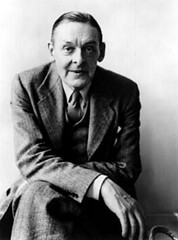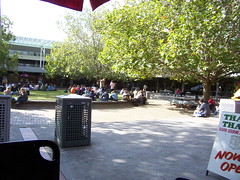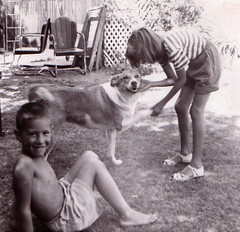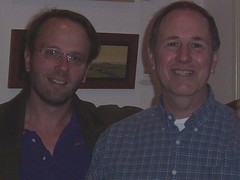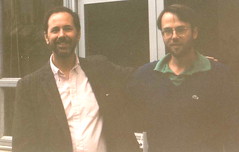Way back in the 1960s, when I was a lot younger, I remember Steve Martin, the comedian, saying that he was going to write a book one day only using verbs, because so many things just kept happening! That one-liner came back to me when I was reading the lessons for today.
There so many actions and verbs in today’s lessons. From the Hebrew scripture we have a vision of, “Angels ascending and descending” to start us off right. And the Psalm is filled with the our responses to God’s actions: “When I sit and when I stand, sleeping and waking, you encompass me before and behind, lay your hand upon me, lead me and hold me, search me out and know me.” We hear verbs in Paul’s letter to the Romans as well: we are “suffering and glorifying, revealing, waiting with longing to be set free, groaning with labour pains, hoping and waiting with patience, crying Abba.” Then in the reading from the Gospel of Matthew: we hear of the actions of heaven; “sowing seed, growing gathering, harvesting, weeping, shining like the sun, listening.” All these verbs: all these actions.
It doesn’t stop there; we say them, take them on, ourselves in the baptismal service, in the vows we make for ourselves or on behalf of others; we agree,
“to strive to live as a disciple of Christ, loving God with your whole heart, and your neighbor as yourself.”
“to know Christ’s forgiving love and continue in the fellowship of the church…[and to proclaim] by word and example, the good news of God in Christ…
So with all this verbiage, you can see why Richard Holloway, the former Primate of the Scottish Episcopal church wrote that it might be helpful to distinguish between Orthodoxy – right formulas of belief – and Orthopraxy –right ways of living, living out our belief. Because belief – as in “I believe” – turns ouf to be a verb as well.
So I used to think that it would be a good idea to have a sermon time where someone stood and, instead of talking, did something like Tai-Chi, so that we could see what a dedicated body can do. Not just talking it, but seeing it move out right in front of us: somehow to see belief in action.
Then I realized that our liturgy is just that kind of moving picture; a kind of choreography of belief. Visitors and newcomers notice that more than those of us who are regulars in the weekly routine: for they see how very odd it is. We sit, stand, kneel and bow. Some of us cross ourselves this way and that, we pass and give and receive, move forward and back. Finally returning to the same place, but changed, somehow, by the motions we go through. You can see newcomers looking around, thinking, “What in God’s name are they going to do next?” But what we are acting out in this place ia an exercise in orthopraxy; a kind of spiritual workout routine, for the rest of our lives in the rest of the world.
You see, a good corporate liturgy, with people really worshipping together, is a kind of icon in motion, a vehicle of altered consciousness that’s made to show all the detail, all the light that’s already there. Like a great photo that gives you a depth of seeing that you might have overlooked before, or one of those rare snapshots that shows someone looking like they might be if they live life right, make the right choices, get good gifts. That’s what we’re about while we are in this place: to sharpen up our vision, our expectancy, and our action! We come here to get the world inside and outside in that kind of focus.
The rite of Baptism is the first swipe at cleaning up the lens so that we can truly see when we look at the world and at ourselves. Baptism is death to the superficial lie that we are alone, disconnected, not needful of others, can do it ourselves. Baptism burns through and murders the false myths of individuality and autonomy. What we do at the font cleans up our illusions about who we are and what the world is: then it washes us into this new creation of contingency and community and charism, that world of God’s ongoing gift of life together with everyone.
We get drowned and cleaned up at the font, deadened and raised to begin again so that we can take up the work of the baptized, to take this true water of life and spread it around, to wash the world and make it shine. And that’s just the start. Because if you really look, you can learn to see our whole liturgy, from Baptism on, is nothing less than a dancing class. Here we learn the radical choreography, where we come to move in the world with the God in whom we live and move and have our being. In the end, it is all about the verbs, the actions that we learn here.
We come to church on Sunday, bringing nothing less than our selves, our whole selves, souls and bodies, to the Eucharist. Bringing all our particular questions and concerns, issues and ideas, histories, hopes and fears, the best and worst of who and what we are, where we come from and where we are going. Taking all that when we get here and mixing it up with this liturgy of confession and praise, mercy and glory, in listening and responding to the words in psalm and scripture, the articulation of the community of faith gathered through history into the present day. Presenting our sins, our concerns, our thanksgivings, all our self-offerings: and then joining with Jesus in his self-offering as disciples and friends, taking part in this eternal communion. Taking all that we have and all that we are, and giving it all over, giving it all up as we take his body and blood, and remember that we are members of his body. This is what we do: this is who we are.
So what you see here is really faith moving on, the point of the whole dance routine. See, we come to reach for Christ; and Christ comes to us and uses our ministry to reach out to the world. We come to get a grip on him; and we stay to learn to hand him to the world and hand the world back to him. For the hands which grasp the body and blood of Christ here, are the same hands -same body- that touch the world in daily life in the places where we make business, peace, war and love, touch the lives of friends and strangers, spend our days. The love of God in Christ reaches into the particulars of all our daily liturgies so that we come to move like Christ in all these places.
Each and every one of our ministries happen when we create, redeem, and relate like God, wherever we are: where we give our gifts. It doesn’t matter whether it be how to throw a ball, cook a pie, write a paper, fix a fixture, apply an appliance, tell a tale or do a deed. Ministry happens when you lovingly act to share the part of the world that you know well, where the actions and attitudes are clear to you, where you act to give that clarity and light to others, so that they can take part in that relationship, that action as well. Some people heal with kindness, others love the stranger, listen well. Some make justice, visit the sick, give to the poor, live cheerfully, tell the truth. Sometimes we just show up, but we do what we can.
And it is very important to note that the best gift we give may not be most important we have: that gift may not be the one we take the most pride in. As a teenager I was painfully shy and fearful; the world looked untrustworthy, most people looked dangerous, and most actions seemed doomed to failure. It took some time for me to come to learn that people were, for the most part, good and kind; that there was freedom to learn and grow; that there would be places on the pathway where I could find the beginning of trust and friendships and communities that could lead me to a faith that more was possible. It took awhile. But all this extended adolescence came together later to let me sit with people who are going through the pain of early adulthood and the transitions of real life and helped me to say, with some authority, “I know, I’ve been there, God is there too.” This early liability in my life turned into a gift of God for others in working as a university chaplaincy: it was a gift I didn’t expect and I give thanks for it. We all have them, surprising gifts, to receive and give as gifts for the gathering harvest.
For each one of us, as members of Christ’s body, is called to proceed – dance, if you like - into the world which God loves, day after day, year after year, time after time: to take on the tasks of stewardship in this wonderful world: to be present to family, friends and strangers, in tasks, hobbies, jobs and joys, present in the times of frustrations and puzzlements, present in agreements that must be honored, in situations that must be met. All of these are places where we act out, serve out, flesh out, live out the reconciling life of Jesus - in serving love of every kind - in the ministry of acceptance, love, and forgiveness. For those are the places and the actions where we shall both find and serve the very God who loves and serves us.
May God give us grace today to take up our lives and our ministries as gifts to be received and gifts to be given, and all in Christ’s name. Amen.
